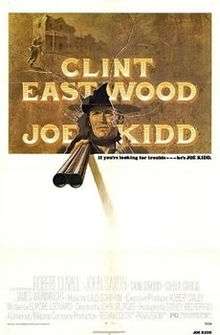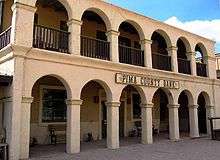Joe Kidd
| Joe Kidd | |
|---|---|
 | |
| Directed by | John Sturges |
| Produced by |
Sidney Beckerman Robert Daley |
| Written by | Elmore Leonard |
| Starring |
Clint Eastwood Robert Duvall John Saxon |
| Music by | Lalo Schifrin |
| Cinematography | Bruce Surtees |
| Edited by | Ferris Webster |
| Distributed by | Universal Pictures |
Release dates |
|
Running time | 88 minutes |
| Country | United States |
| Language | English |
| Box office | $6,330,000 (North American rentals)[1][2] |
Joe Kidd is a 1972 American Technicolor western film in Panavision starring Clint Eastwood and Robert Duvall, written by Elmore Leonard and directed by John Sturges.
The film is about an ex-bounty hunter hired by a wealthy landowner named Frank Harlan to track down Mexican revolutionary leader Luis Chama, who is fighting for land reform. It forms part of the Revisionist Western genre.
Plot
Set in the early 1900s, Clint Eastwood stars as Joe Kidd, a former bounty hunter who is in jail for hunting on Indian land and disturbing the peace in the New Mexican town of Sinola. Mexican bandito/revolutionary Luis Chama (John Saxon) has organized a peasant revolt against the local landowners, who are throwing the poor off land that rightfully belongs to them.
When a posse — financed by wealthy landowner Frank Harlan (Robert Duvall) — is formed to capture Chama, Kidd is invited to join, but prefers to remain neutral. Harlan persists and Kidd finally relents when he learns that Chama's band has raided his own ranch and attacked one of the workers.
The posse rides into a village and forces the villagers into the church at gunpoint. They threaten to kill five Mexican hostages unless Chama surrenders. Harlan throws Kidd into the church to prevent him from helping Helen, a female captive who is also Chama's lady love (unbeknownst to Harlan), and the other Mexican hostages.
Kidd manages a daring escape and saves the hostages, determined to find Chama on his own and see that justice is done, but when he does capture Chama and delivers him to Sheriff Mitchell (Gregory Walcott) Harlan is already waiting for them in town.
To get to the jailhouse, Kidd drives a steam engine through the town saloon. A gunfight then ensues between Kidd and Harlan's men. Kidd manages to kill Harlan in the courthouse by hiding in the judge's chair. Chama then surrenders to Mitchell, but not before Kidd punches the sheriff for not standing up to Harlan and his murderous plan. Kidd then collects his things and leaves town with Helen.
Cast
- Clint Eastwood as Joe Kidd
- Robert Duvall as Frank Harlan
- John Saxon as Luis Chama
- Don Stroud as Lamarr Simms
- Stella Garcia as Helen Sanchez
- James Wainwright as Olin Mingo
- Paul Koslo as Roy Gannon
- Gregory Walcott as Sinola County Sheriff Bob Mitchell
- Dick Van Patten as Hotel manager
- Lynne Marta as Elma
- John Carter as Judge
- Pepe Hern as Priest
- Joaquín Martínez as Manolo
- Ron Soble as Ramon
- Pepe Callahan as Naco
- Clint Ritchie as Deputy Calvin
Production

Eastwood was given the script by Jennings Lang, written by novelist Elmore Leonard. Originally called The Sinola Courthouse Raid,[3] it was about a character inspired by Reies Tijerina, an ardent supporter of Robert F. Kennedy, known for storming a courthouse in Tierra Amarilla, New Mexico in an incident in June 1967, taking hostages and demanding that the Hispanic people have their ancestral lands returned to them. Leonard depicted Tijerina in his story, a man he named Luis Chama, as an egomaniac, a role which went to John Saxon. Robert Duvall was cast as Frank Harlan, a ruthless land owner who hires Eastwood's character, a former frontier guide named Joe Kidd, to track down the culprits and scare them away. Don Stroud, who Eastwood had starred alongside in Coogan's Bluff, was cast as another sour villain who encounters Joe Kidd.
Under the director's helm of John Sturges, who had directed acclaimed westerns such as The Magnificent Seven (1960), filming began in Old Tucson in November 1971,[3] overlapping with another film production, John Huston's The Life and Times of Judge Roy Bean, which was just wrapping up shooting.[4] Outdoor sequences to the film were shot near June Lake, east of the Yosemite National Park.[4] The actors were initially uncertain with the strength of the three main characters in the film and how the hero Joe Kidd would come across.[5] According to writer Leonard, the initial slow development between the three was probably because the cast were so initially awestruck by having Sturges direct that they surrendered authority to him.[5] Eastwood was far from being in perfect health during the film and suffered symptoms that suggested a bronchial infection, in addition to having several panic attacks, falsely reported in the media as his having an allergy to horses.[6] During production, the script for the finale was altered when producer Robert Daley jokingly said that a train should crash through the barroom in the climax, and he was taken seriously by cast and crew, who thought it was a great idea.[4]
Reception
Joe Kidd was released in the United States in July 1972, and it eventually grossed $5.8 million.[3] The film received a mixed reception from critics. Roger Greenspun of The New York Times, in his review of the film wrote, "I think it is a very good performance in context. Like so many Western heroes, Joe Kidd figures even in his own time as an anachronism — powerful through his instincts mainly, and through the ability of everybody else, whether in rage or gratitude, to recognize in him a quality that must be called virtue. The great value of Clint Eastwood in such a position is that he guards his virtue very cannily, and in the society of "Joe Kidd," where the men still manage to tip their hats to the ladies, but just barely, all the Eastwood effects and mannerisms suggest a carefully preserved authenticity."[7] The New York Post praised the actors' performances while criticizing the film, calling the actors "diamonds set in dung".[8]
See also
References
- ↑ "All-time Film Rental Champs", Variety, 7 January 1976 p 46
- ↑ Glenn Lovell, Escape Artist: The Life and Films of John Sturges, University of Wisconsin Press, 2008 p277
- 1 2 3 Hughes, p.26
- 1 2 3 McGilligan (1999), p.218
- 1 2 McGilligan (1999), p.217
- ↑ McGilligan (1999), p. 219
- ↑ Greenspun, Roger (July 20, 1972). "Joe Kidd (1972)". The New York Times. Retrieved January 23, 2010.
- ↑ Hughes, p.27
Bibliography
- Hughes, Howard (2009). Aim for the Heart. London: I.B. Tauris. ISBN 978-1-84511-902-7.
- McGilligan, Patrick (1999). Clint: The Life and Legend. London: HarperCollins. ISBN 0-00-638354-8.
External links
- Joe Kidd at the Internet Movie Database
- Joe Kidd at AllMovie
- Joe Kidd at the TCM Movie Database
- Joe Kidd at the American Film Institute Catalog
- Joe Kidd at Box Office Mojo